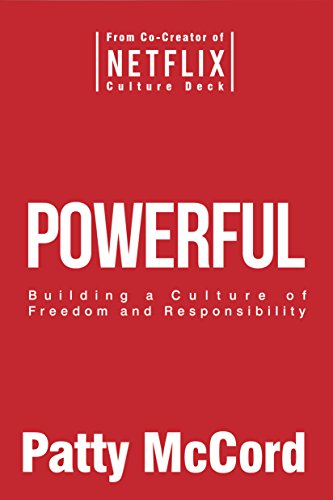What We're Reading Now
Honesty Changes Everything
26 February 2019
Barbara read Powerful: Building a Culture of Freedom and Responsibility by Patty McCord and considered the amount of honesty that is needed to support transformational change.
Tags: barbara read, communication, human resources, thoughtful candor
Last year, Janie wrote a blog post on an article about Patty McCord’s work at Netflix that is a good overview of her approach to changing human resources in an organization. Today, I am zeroing in on McCord’s specific stance on honest feedback.
There have been many articles about feedback and what we describe as thoughtful candor on this blog. As I read about how McCord helped Netflix change from a CD mail-order house to streaming and original programing of movies and TV series, I found myself glad for a real life example of how the thoughtful candor we recommend can help you get what you want.
I had heard late night comics and friends talk about “binge watching” something on Netflix for about a year before I knew what it was, and I was slightly amused. Then I watched the first season of The Ranch in two days, and I experienced what I read about Netflix’s culture that is written on their Jobs website, “Entertainment, like friendship, is a fundamental human need; it changes how we feel and gives us common ground. Netflix is better entertainment at lower cost and greater scale than the world has ever seen. We want to entertain everyone, and make the world smile.” Netflix has achieved this goal with me as a customer over and over again, so I wasn’t surprised to learn that difficult feedback was a part of achieving their mission.
Radical honesty was needed to keep Neflix afloat in the midst of rapid change. The high risk of attempting to win out over Blockbuster may have been what drove them to get more tough about honest feedback than most organizations are willing to do. They put together a PowerPoint presentation to tell employees and potential new hires what behavior was expected. It was posted online, went viral, and became known as the Netflix slide deck.
“One of the pillars of the Netflix culture was that if people had a problem with an employee or with how a colleague in their own department or somewhere else in the company was doing something, they were expected to talk about it openly with that person, ideally face to face.”
When McCord was head of HR, people would come to her to tell her problems they were having with other employees. She would let them vent and then she always said, “Have you told her yet?” The employees would flinch claiming they couldn’t say that. (“Have you told them?” are some of the words on our wall at Allison Partners.)

McCord wrote, “Most of us feel that we can’t tell the people who work for us or with us the truth because (a) they’re not smart enough to understand it, (b) they’re not mature enough to understand it or (c) it wouldn’t be nice….But this desire to make people feel good is often as much a desire to make ourselves feel good as to do the right thing. It often leads to people actually feeling worse, because they’re not correcting a problem in the way they’re working, and that eventually comes home to roost.”
One hire who moved quickly to becoming a VP because he learned to benefit from the expected honesty said “…when he started getting critical feedback from colleagues at Netflix, ‘It hurt. People told me…you’re not good with communication; when you need to get a message out to a wide audience, you take too long to make the point and it’s unclear.’” But he got over his hurt feelings, changed how he communicated, and moved up the organization at a surprising rate.
Netflix needed total honesty in order to help the business change fast, so they modeled it at the top. In an executive meeting people gave each other feedback using the “start, stop, continue” method in front of everyone. “In this drill, each person tells a colleague one thing they should start doing, one thing they should stop doing, and one thing they’re doing really well and should keep doing.” Word spread throughout the organization that even the high ups were giving honest feedback, so everyone became more comfortable with it.
Feedback should be about behavior, not a generalized statement about a person’s character. McCord received this kind of specific feedback herself, “You’re always talking so much that others don’t get a chance to get their two cents in.” She made sure she “shut up and listened more.” A negative generalized statement about her character would have been—She’s so selfish. Those words don’t explain exactly what she needed to change.
If you need to give honest feedback, write it out first. These questions can help. Practice with a friend and get suggestions for what you could add or take out, or record your words on your phone to make sure your tone of voice is calm and confident, not mean and harsh.
Who needs to hear total honesty from you? Can you get yourself ready to give or receive it so your business or your personal life improves?







Comments
Our Comment Policy:
Our blog posts are only half of the conversation. What our readers have to say is equally important to us, and we're grateful for all the comments that continue the dialog.
To ensure that the discussion here is as useful as possible to all of our readers, please be respectful of our contributors and refrain from harassing, threatening and/or vulgar language. We reserve the right to screen and remove any comments from the site. If you have a question about a comment or want to discuss our policy, please contact us. We'll talk it over.
There are no comments for this entry yet.